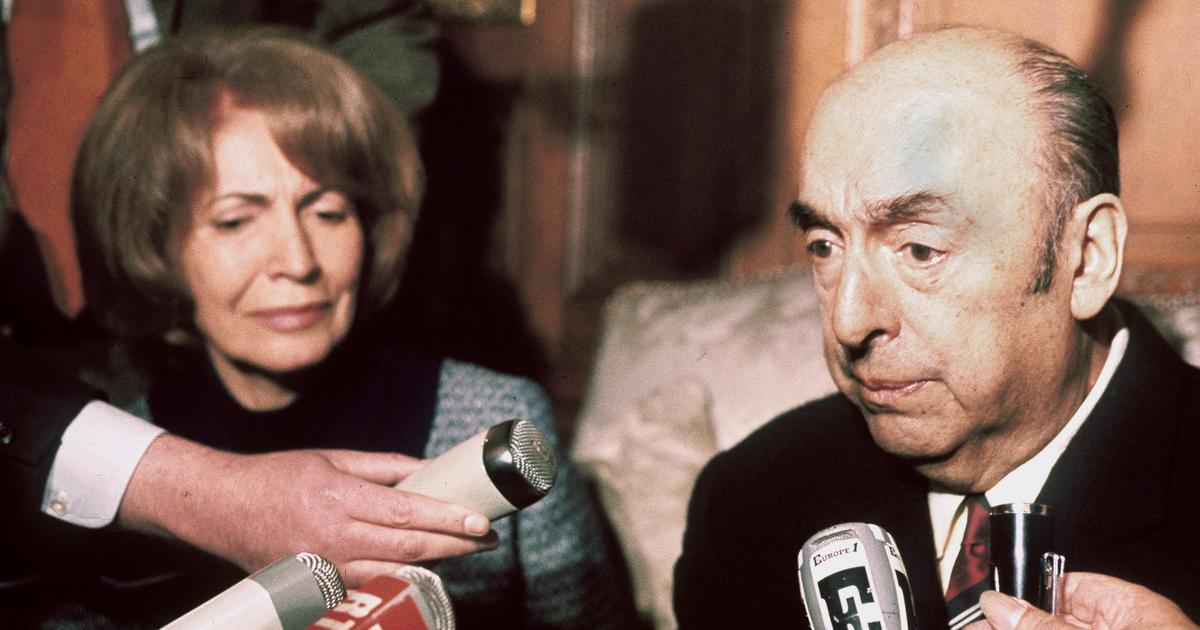In October 2019, more than a million Chileans took to the streets in what became the largest protest in the country.
Few things united them: some demanded better education, others more rights for the indigenous people.
They had no leaders or symbols.
But as things calmed down, one image gradually became a prominent emblem.
A mural in downtown Santiago showed an older woman dressed in black combat boots, faded jeans and a T-shirt with the lyrics of a punk rock band.
She had her neck wrapped in a green scarf, the signature of Latin American abortion rights activists.
In her left hand she held a crossed out national flag;
on the right, an open book.
The woman was
Gabriela Mistral
, a Chilean poet, educator and diplomat, the first Latin American to win the Nobel Prize for Literature, in 1945. Mistral, long depicted in old-fashioned clothing and known for writing poems about children, is being vindicated by a new generation of feminist and LGBTQ activists as an anti-establishment figure, and has sparked a debate about how we appropriate literary figures from the past.
“My gut told me that Gabriela was a good figure to accompany this whole cause,” said Fab Ciraolo, the artist who painted the mural.
"For women, gay rights, the rights of the poor — she touches on all of those issues."
Interest in Mistral
, who died on Long Island in 1957 , has increased in recent years.
In 2020, the Chilean Ministry of Culture published an eight-volume digital anthology of her poetry and her letters and essays, one of the most important compilations to date. the date.
In 2021, a selection of letters from Mistral to Doris Dana, his eternal companion and executor, was published to great acclaim.
This spring, two decades after its controversial publication in English, a Chilean publisher will publish
A Queer Mother for the Nation: The State and Gabriela Mistral
, by Licia Fiol-Matta, a professor of Latin American literature at New York University.
Chilean President Gabriel Boric, 36, has mentioned Mistral as one of her favorite poets and quotes her frequently.
And although Mistral is everywhere in Chile – her name adorns streets and her face appears on the 5,000-peso bill – her legacy has long been the subject of controversy.
Born Lucila Godoy Alcayaga in 1889,
Mistral
grew up in the remote Elqui Valley in northern Chile.
Her father abandoned the family when she was a baby and she was raised by her mother, a seamstress, her older sister, a schoolteacher, and her grandmother.
Although they lived in a two-room shack and Mistral didn't finish elementary school, she had one big advantage, according to Elizabeth Horan, an Arizona State University professor of literature: All the women in Mistral's family were literate, at one time. in which less than a third of the population knew how to read and write.
Mistral's biography in Spanish, which Horan worked on for 25 years, will be published by Random House later this year.
Mistral
was a rural teacher's assistant and sent poems and essays to local newspapers in her spare time.
In an article published when she was 17, she boldly pleaded with her state to educate women, arguing that "there is nothing about her that should lower her rank than men."
Although she worked as a teacher throughout Chile, Mistral's humble origins and lack of a formal degree impeded her professional advancement.
In 1922, she accepted an invitation from the Mexican government to reform the public education system, and she never returned to Chile.
The rest of her life she worked as a consul and visiting professor in Spain, Portugal, France, Brazil, Italy and the United States, where she taught at Columbia University.
Despite the fame he acquired abroad, his work was ignored in his country.
Of the four poetry books that he published during his lifetime, three were published outside of Chile.
Her poems about childhood are included in school curricula, but his political essays, which often took internationalist and pacifist stances and championed the underprivileged, indigenous people and women, were long sidelined.
When the military seized power in 1973, Chile's most famous poet was
Pablo Neruda
, a Nobel laureate and atheist communist.
Mistral, on the other hand, seemed like a desirable cultural figure.
The regime “manipulated his work to the point that his poems were seen as naive and cute, when in reality they are powerful social critics,” said Alejandra Araya, director of an archive that houses some of Mistral's work.
The authorities even put Mistral's face on the coin and promoted her image as the nation's teacher.
Most Chileans knew her as the “gray, ugly and boring old woman” who frowned at them from a ticket, said María Elena Wood, a filmmaker who filmed a documentary about Mistral in 2011. After the end of the
dictatorship
in In the 1990s, some scholars began to question her image as a saintly spinster.
But what they were saying about her personal life met with resistance.
“Mistral was a very protected icon,” explained Fiol-Matta, whose book was rejected by local publishers in part because it said the poet was a closeted lesbian.
"They told me that she was bringing something alien to Chile, that she wanted to see lesbianism everywhere."
In 2007, the cracks began to widen.
That year, numerous letters between Mistral and Dana were made public.
In them, Mistral oscillates between a doting mother—she often called Dana, 31 years her junior, “my little girl”—and a jealous lover of her, berating her for hanging out with other men and women.
“I live glued to you like one possessed, except when I read or write,” Mistral wrote in 1950. In another written exchange, Dana tells Mistral: “Do you think that the way I look at you and the way I look at you touch you there are things I can not say or show?
I love you with the fullness of my being."
Mistral
categorically denied being a lesbian.
However, some scholars claim that the letters and Mistral's unusual lifestyle indicate that she at least was queer.
She lived long periods of time with secretaries who acted as confidants.
And she adopted and raised her nephew with another woman, Palma Guillén, a Mexican diplomat.
Now, decades after the dictatorship first appropriated Mistral's image, Chilean activists honor her as a feminist and LGBTQ hero, even though Mistral never identified with either.
“Here is a debate: Can we say that Gabriela Mistral was a lesbian if she never said it?
I prefer to say that she disagreed with heteronormativity,” said June Garcia, an author who runs a feminist book club.
Garcia added that while Mistral did not call herself a feminist, she was "someone who took the values of equality and justice seriously, and those are the values that ultimately drive us today."
Chile experienced a #MeToo moment in 2018, when thousands of women at universities denounced sexual harassment and began to reassess their study plans.
One of the beneficiaries of the movement was Mistral... and one of its victims, Neruda, increasingly cancelled.
Feminists argue that
Neruda
abandoned his wife and daughter, who was disabled, and refer to a passage in his memoirs, published in 1974, in which he describes the rape of a maid while he was a diplomat in what is now Sri Lanka. .
“I decided to go all the way.
I held her tight by the wrist,” she wrote.
"The encounter was of a man with a statue."
The passage has lately caused outrage, and in 2018 Congress withdrew a proposal to rename the Santiago airport after Neruda.
Feminist protests have gone hand in hand with a growing LGBTQ movement in Chile.
A government survey published in November revealed that the percentage of Chileans between the ages of 15 and 29 who identify as lesbian, gay, transgender or non-binary has quadrupled in the last decade to 12%.
“We are looking at our genealogy for lesbians and queer figures, looking back to find ourselves and see that we have been here all along,” said Claudia Cabello Hutt, a Chilean who identifies as queer and is an associate professor of Spanish at the University of North Carolina, Greensboro.
“A time of powerful feminist movements, a time when we denounce violence against women,” Cabello Hutt said, “is not Neruda's time.
It is the moment of Mistral”.
© The New York Times
Translation: Elisa Carnelli
look also
Was Neruda killed?
I don't believe it or maybe it was like that
look also
The Pinochet dictatorship in Chile: the death of Pablo Neruda, a mystery hours away from being clarified









/cloudfront-eu-central-1.images.arcpublishing.com/prisa/2GNBO4PDRBFIZPEA56Z5BU5F7U.jpg)



/cloudfront-eu-central-1.images.arcpublishing.com/prisa/KMEYMJKESBAZBE4MRBAM4TGHIQ.jpg)

